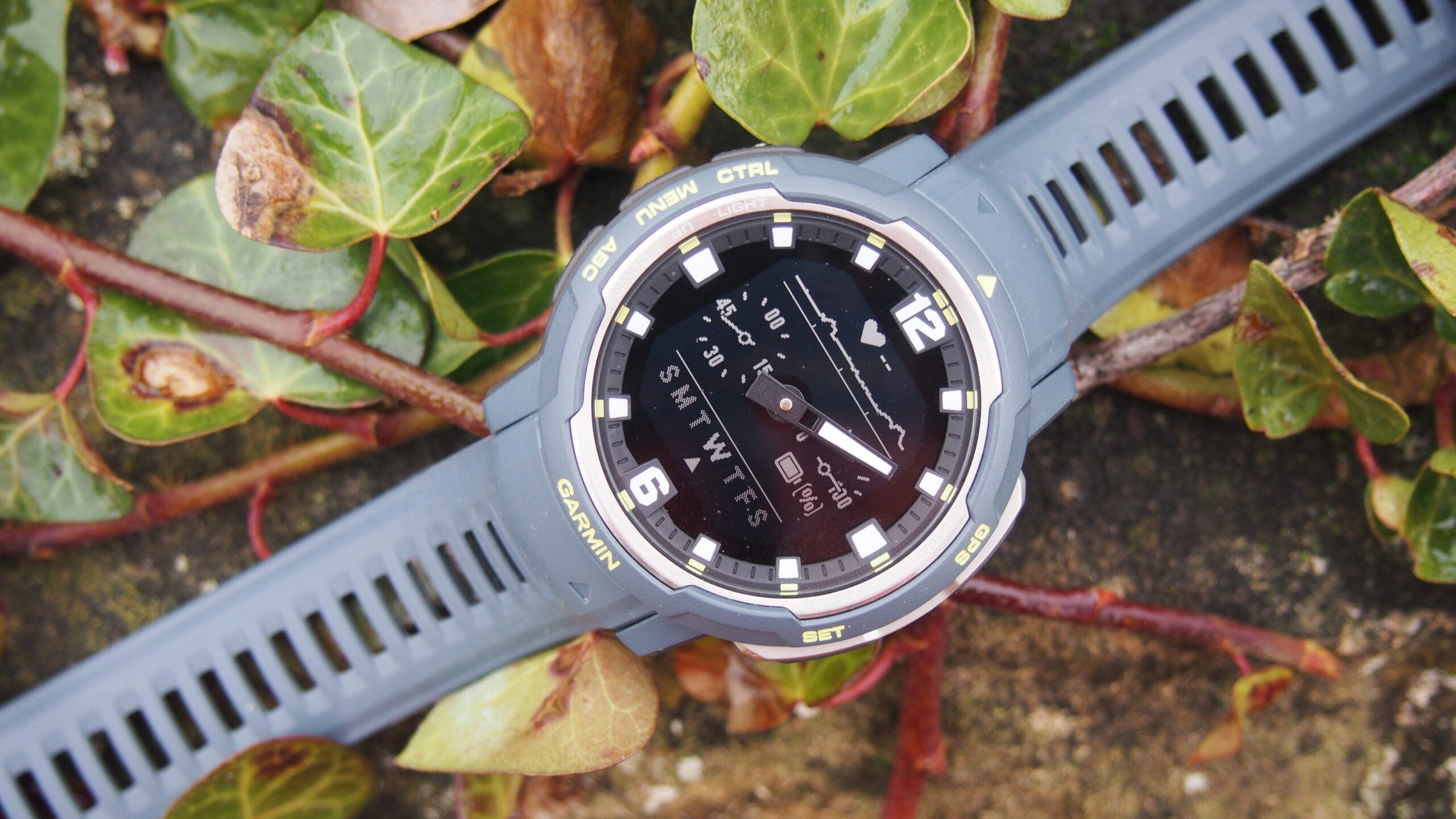While the Garmin Instinct Crossover offers a good core sports tracking experience, it doesn’t deliver the perfect marriage of smart and analogue watch design and is a rare miss from Garmin.
Pros
- Generally solid sports tracking
- Good battery life
- Larger battery than Instinct 2
Cons
- Analogue hands not a great addition
- More expensive than Instinct 2
- Some performance and UI niggles
Availability
- UKRRP: £479.99
- USARRP: $499.99
Introduction
The Garmin Instinct Crossover is a smartwatch that combines analogue and digital watch movements to give you the best of two timekeeping worlds.
Landing later than the Garmin Instinct 2 in 2022, the Crossover essentially offers the same distinctive, rugged design and range of features that make it a more affordable outdoor watch alternative to the pricier Garmin Fenix 7 series range.
That means you’re getting something that can track runs, rides, swims and hikes and also help you better navigate your way to your next big adventuring spot. It’s also packing smarts like payments and access to Garmin’s Connect IQ store to bolster its abilities as an outdoor tracking companion. That’s all while delivering weeks and potentially months of battery life, depending on how you use it.
It comes in pricier than the Instinct 2, so does the Crossover do enough to justify paying more and does the analogue gamble pay off? Here’s our take.
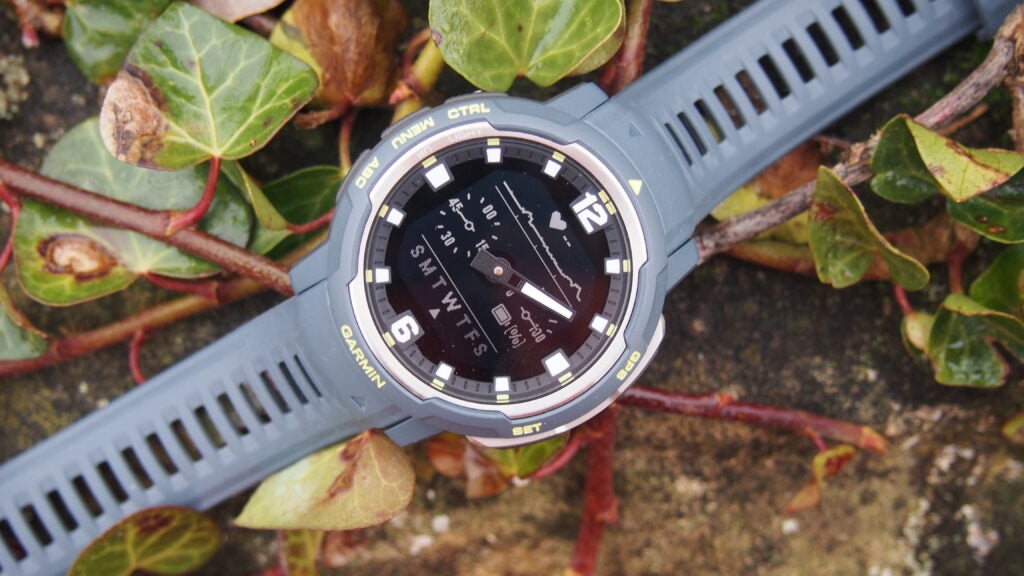
Design and screen
- Comes in solar and non-solar models
- Analogue watch hands
- 45mm case option only
- Waterproof up to 100 metres
The Instinct Crossover is essentially the same watch as the 45mm version of the Instinct 2, though it comes in thicker and heavier in comparison. You’re still getting the same polymer case with a bezel that carries some additional heft to contribute to that overall weight gain. It’s still not a heavy watch by any stretch of the imagination and it’s comfortable to wear during workouts and it’s certainly lighter to wear to bed than something like a Fenix 7.
There’s no touchscreen, so it’s over to the array of five physical buttons dotted around the case and that surrounds a 0.9-inch by 0.9-inch transflective display with a set of luminous analogue hands that are designed to dynamically move when you need to clearly read something on the screen. That is the theory at least, but in practice, the analogue hands feel like an awkward addition here. Yes, they do move out of the way when you need to better read what’s on the screen, but it ruins the navigation experience and using watch faces when notifications sit untidily above and below those hands.
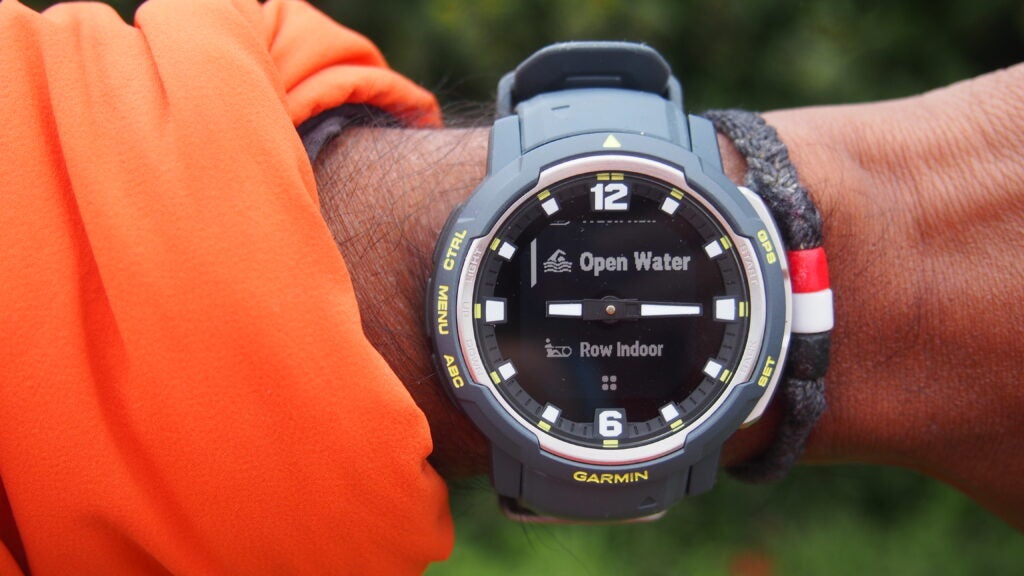
Garmin uses a pretty standard 22mm silicone strap, which is the QuickFit kind and that means it’s one of the easier ones to remove and swap in a new one. The strap included is perfectly fine from a comfort and security point of view. As a package, it matches the Instinct 2’s waterproof rating, giving you something that’s safe to be submerged in water up to 100 metres in depth.
Like the Instinct 2, Garmin does offer the Crossover in both solar and non-solar options, swapping in Power Glass for the chemically strengthened display on the regular version, which does invariably push the price up as well as the battery life you can expect.
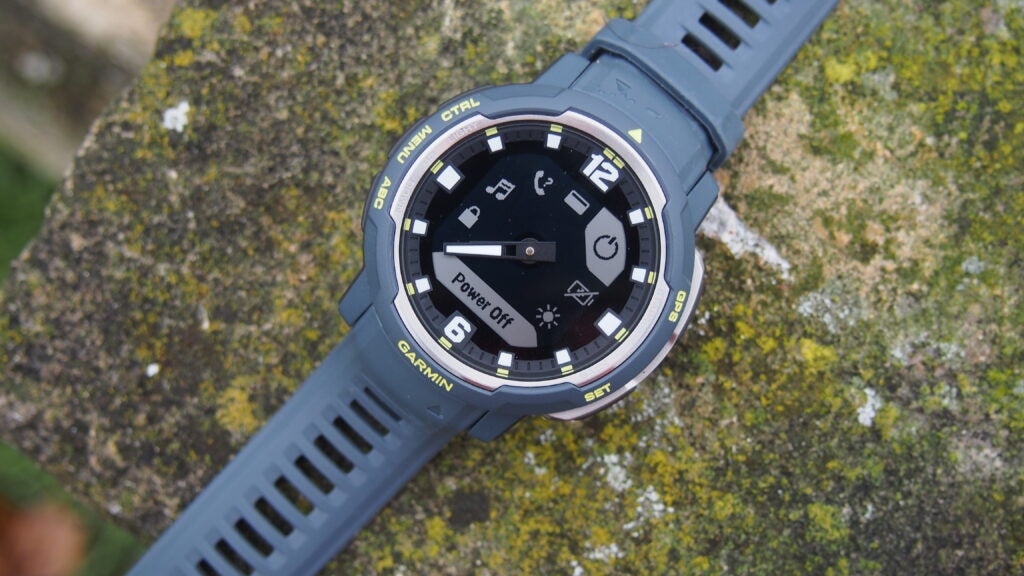
Software and smartwatch features
- Works with Android and iOS
- Garmin Pay
- Connect IQ access
- No music player
The Instinct Crossover gets the same level of smartwatch-style features as the Instinct 2, which means you don’t get everything Garmin has to offer in this department, but there’s enough to make it a largely dependable watch to have when you’re not tracking workouts.
It’s compatible with Android phones and iPhones, and the Garmin Connect companion app experience is very consistent across both platforms. On the watch, you can view notifications, access music playback controls and make use of Garmin Pay if you have a compatible bank, and you can download apps, data fields, widget and watch faces from the Connect IQ store.
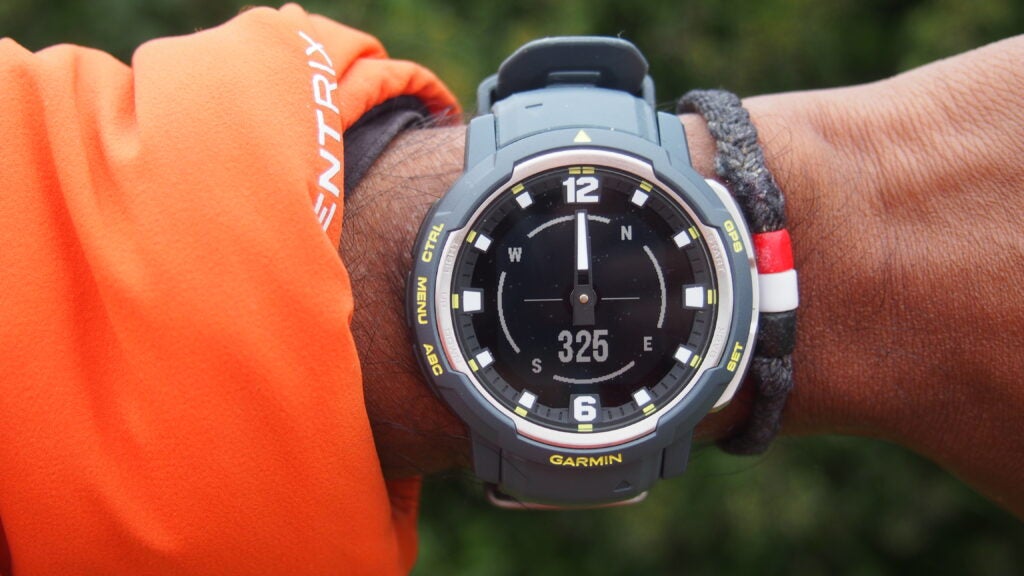
The big difference here are the hands and how they have to shift out of the way to let you view notifications or use those music controls. The hands will move to 3 and 9 to let you see information above and below the centre, however if you like switching up watch faces, then you can never really appreciate the good ones as those hands sit on top of them.
There aren’t really any analogue-specific features here other than the promise of accurate timekeeping, but that’s hardly something to get hugely excited about.
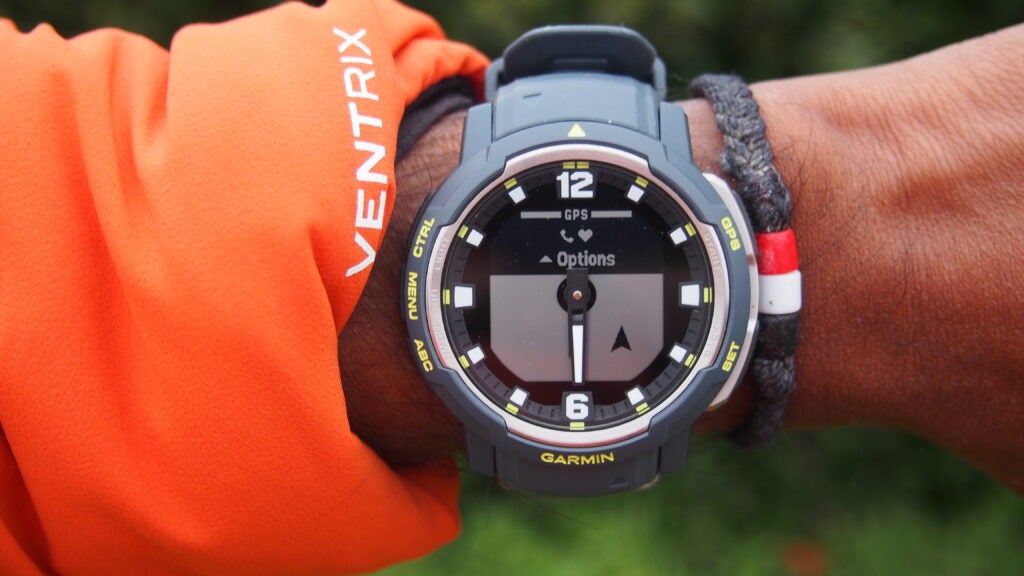
Fitness tracking
- Trackback routing and breadcrumb navigation
- Pulse OX and heart rate monitoring
- Daily workout suggestions and recovery advisor
The Crossover is an Instinct 2 at heart so you can expect pretty much the same features that will let you use it to track your outdoor adventures, indoor workout time and to keep you safer when you’re out adventuring. It works as a fitness and sleep tracker and you can see insights like fitness age and VO2 Max estimates to get a better sense of your current level of fitness.
If you’re grabbing the Crossover though, you’re likely grabbing it for its outdoor tracking capabilities and the good news is that it’s pretty solid on that front. Accuracy-wise, the GPS connection held up well against another Garmin watch in the more accurate multiband GPS mode that the Crossover lacks. Heart rate performance however wasn’t spotless and even on steady paced workouts it recorded much higher maximum readings compared to a heart rate monitor chest strap. The key takeaway here would be to grab a chest strap and pair it up if you care about heart rate data.
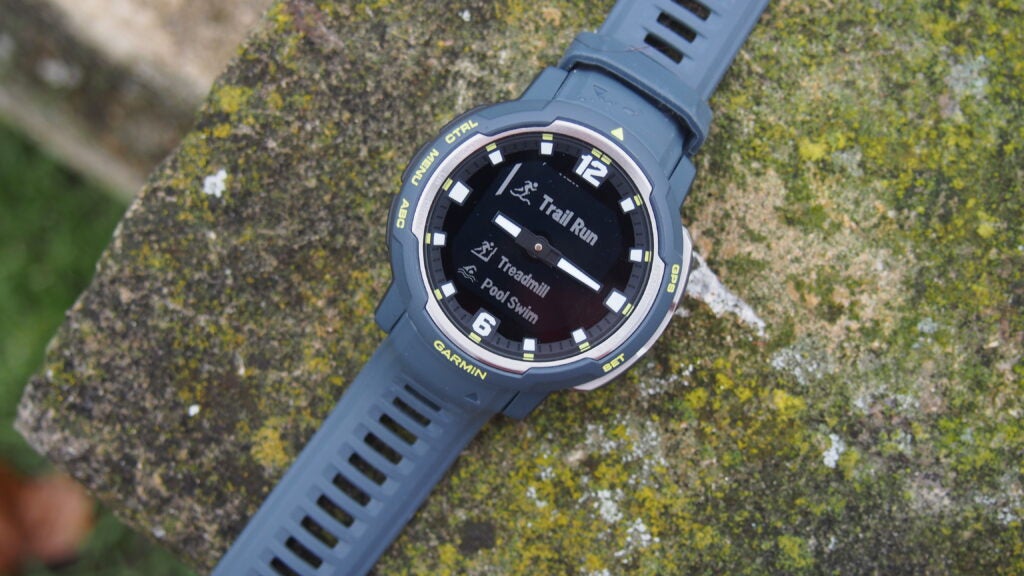
While you’re not getting the full mapping support that you get on pricier Garmin watches, you do get the ability to upload routes to the Crossover and have point-to-point navigation and simpler breadcrumb-style navigation along with useful modes like back to start. This is a part of the Crossover experience where those hands feel more of a hindrance than a help, even if they are shifted out of the way.
Elsewhere, features like pool swim tracking and tracking for indoor workouts like rowing were generally very good and a lot of the features you find on other Garmins already work in a similar fashion. Daily suggested workouts need some time to be in tune with your workout history, and continuous heart rate monitoring is pretty reliable on the whole while sleep monitoring has both good and off days in terms of capturing sleep duration. The onboard Pulse Ox sensor offers some additional wellness data during sleep but at the expense of battery life as is the case on other Garmin watches that pack it.
You’re basically getting the same watch as the Instinct 2 with the addition of those analogue hands that do feel like more of a nuisance than actually being useful to have around.

Battery life
- Up to 28 days in smartwatch battery life
- Up to 25 hours in GPS battery life
- Up to 40 days in Expedition mode
In typical Garmin fashion, the Instinct Crossover is a watch that’s capable of going for weeks as opposed to days and that all depends on how and what you’re using on a regular basis.
In general smartwatch mode you’re getting the same 28-days as the Instinct 2. It’s capable of going for up to 71-days in the more basic battery saver mode and you can get anywhere from 25-111 hours of GPS battery life depending on the sampling rate of that GPS.
In general, with regular use of GPS tracking, notifications enabled and features like continuous heart rate monitoring and sleep tracking in use the Instinct Crossover tended to last a solid week with the capacity to go longer. We saw a daily drop-off in general of around 5% and an hour of GPS use saw the battery drop to around 7-8%.
The Crossover does come in a solar version of course and that will give you a sizable battery boost, if you use it in the type of conditions that can enable that boost. So 28-days of smartwatch battery life can become 70-days and the best GPS accuracy mode will go from 25 to 31 hours. This all entirely depends on keeping that watch exposed to enough outdoor sunlight, which in a cold, cloudy UK isn’t the easiest thing to do.
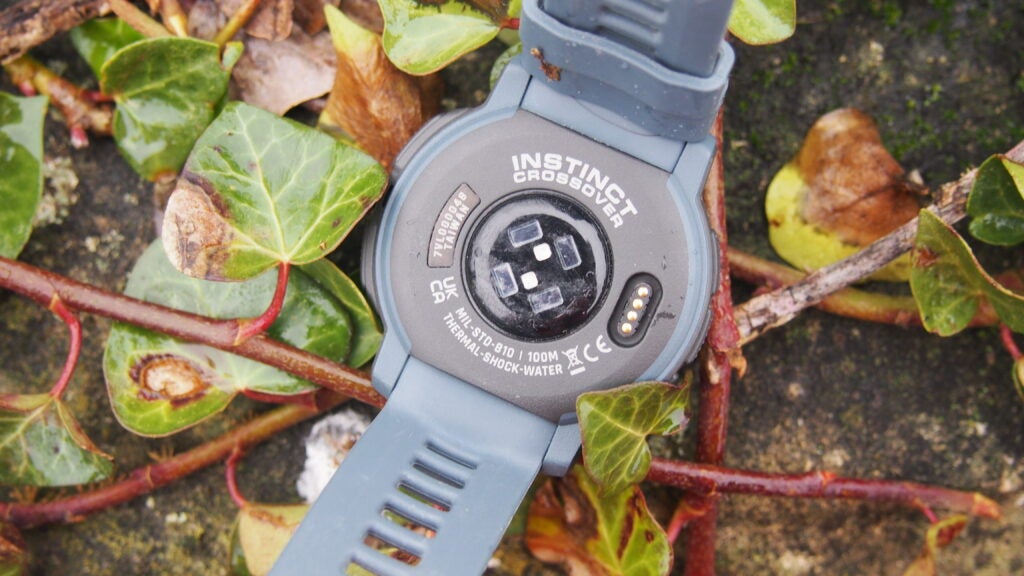
Latest deals
Should you buy it?
You want an outdoor watch with analogue hands: The Crossover gives you those great Instinct features with the promise of accurate timekeeping and hands that mostly steer clear when you need to use those features.
You want the best version of the Garmin Instinct: Losing the sub display makes the Crossover a less useful watch to have when you’re out exploring.
Final Thoughts
The Garmin Instinct Crossover was a clear attempt at reaching out to the traditional watch crowd and some might like the idea of having a fully capable sports watch with some analogue styling. Its execution however isn’t great and ultimately those analogue hands feel like they get in the way of a Garmin watch that doesn’t quite hit the design mark.
How we test
We thoroughly test every fitness tracker we review. We use industry standard testing to compare features properly and we use the watch as our main device over the review period. We’ll always tell you what we find and we never, ever, accept money to review a product.
FAQs
Yes, but you need to buy the pricier Garmin Instinct Crossover Solar in order to have the feature on your device.
The Garmin IQ app is available on both the Apple App Store and Google Play Store, which makes it possible to pair the watch with an iPhone or an Android phone.
Sustainability
TrustedReviews’ holds the fact that global warming is not a myth as a core value and will continuously endeavor to help protect our planet from harm in its business practices.
As part of this mission, whenever we review a product we send the company a series of questions to help us gauge and make transparent the impact the device has on the environment.
We currently haven’t received answers to the questions on this product, but will update this page the moment we do. You can see a detailed breakdown of the questions we ask and why in our sustainability info page.
While the Garmin Instinct Crossover offers a good core sports tracking experience, it doesn’t deliver the perfect marriage of smart and analogue watch design and is a rare miss from Garmin.
Pros
- Generally solid sports tracking
- Good battery life
- Larger battery than Instinct 2
Cons
- Analogue hands not a great addition
- More expensive than Instinct 2
- Some performance and UI niggles
Availability
- UKRRP: £479.99
- USARRP: $499.99
Introduction
The Garmin Instinct Crossover is a smartwatch that combines analogue and digital watch movements to give you the best of two timekeeping worlds.
Landing later than the Garmin Instinct 2 in 2022, the Crossover essentially offers the same distinctive, rugged design and range of features that make it a more affordable outdoor watch alternative to the pricier Garmin Fenix 7 series range.
That means you’re getting something that can track runs, rides, swims and hikes and also help you better navigate your way to your next big adventuring spot. It’s also packing smarts like payments and access to Garmin’s Connect IQ store to bolster its abilities as an outdoor tracking companion. That’s all while delivering weeks and potentially months of battery life, depending on how you use it.
It comes in pricier than the Instinct 2, so does the Crossover do enough to justify paying more and does the analogue gamble pay off? Here’s our take.

Design and screen
- Comes in solar and non-solar models
- Analogue watch hands
- 45mm case option only
- Waterproof up to 100 metres
The Instinct Crossover is essentially the same watch as the 45mm version of the Instinct 2, though it comes in thicker and heavier in comparison. You’re still getting the same polymer case with a bezel that carries some additional heft to contribute to that overall weight gain. It’s still not a heavy watch by any stretch of the imagination and it’s comfortable to wear during workouts and it’s certainly lighter to wear to bed than something like a Fenix 7.
There’s no touchscreen, so it’s over to the array of five physical buttons dotted around the case and that surrounds a 0.9-inch by 0.9-inch transflective display with a set of luminous analogue hands that are designed to dynamically move when you need to clearly read something on the screen. That is the theory at least, but in practice, the analogue hands feel like an awkward addition here. Yes, they do move out of the way when you need to better read what’s on the screen, but it ruins the navigation experience and using watch faces when notifications sit untidily above and below those hands.

Garmin uses a pretty standard 22mm silicone strap, which is the QuickFit kind and that means it’s one of the easier ones to remove and swap in a new one. The strap included is perfectly fine from a comfort and security point of view. As a package, it matches the Instinct 2’s waterproof rating, giving you something that’s safe to be submerged in water up to 100 metres in depth.
Like the Instinct 2, Garmin does offer the Crossover in both solar and non-solar options, swapping in Power Glass for the chemically strengthened display on the regular version, which does invariably push the price up as well as the battery life you can expect.

Software and smartwatch features
- Works with Android and iOS
- Garmin Pay
- Connect IQ access
- No music player
The Instinct Crossover gets the same level of smartwatch-style features as the Instinct 2, which means you don’t get everything Garmin has to offer in this department, but there’s enough to make it a largely dependable watch to have when you’re not tracking workouts.
It’s compatible with Android phones and iPhones, and the Garmin Connect companion app experience is very consistent across both platforms. On the watch, you can view notifications, access music playback controls and make use of Garmin Pay if you have a compatible bank, and you can download apps, data fields, widget and watch faces from the Connect IQ store.

The big difference here are the hands and how they have to shift out of the way to let you view notifications or use those music controls. The hands will move to 3 and 9 to let you see information above and below the centre, however if you like switching up watch faces, then you can never really appreciate the good ones as those hands sit on top of them.
There aren’t really any analogue-specific features here other than the promise of accurate timekeeping, but that’s hardly something to get hugely excited about.

Fitness tracking
- Trackback routing and breadcrumb navigation
- Pulse OX and heart rate monitoring
- Daily workout suggestions and recovery advisor
The Crossover is an Instinct 2 at heart so you can expect pretty much the same features that will let you use it to track your outdoor adventures, indoor workout time and to keep you safer when you’re out adventuring. It works as a fitness and sleep tracker and you can see insights like fitness age and VO2 Max estimates to get a better sense of your current level of fitness.
If you’re grabbing the Crossover though, you’re likely grabbing it for its outdoor tracking capabilities and the good news is that it’s pretty solid on that front. Accuracy-wise, the GPS connection held up well against another Garmin watch in the more accurate multiband GPS mode that the Crossover lacks. Heart rate performance however wasn’t spotless and even on steady paced workouts it recorded much higher maximum readings compared to a heart rate monitor chest strap. The key takeaway here would be to grab a chest strap and pair it up if you care about heart rate data.

While you’re not getting the full mapping support that you get on pricier Garmin watches, you do get the ability to upload routes to the Crossover and have point-to-point navigation and simpler breadcrumb-style navigation along with useful modes like back to start. This is a part of the Crossover experience where those hands feel more of a hindrance than a help, even if they are shifted out of the way.
Elsewhere, features like pool swim tracking and tracking for indoor workouts like rowing were generally very good and a lot of the features you find on other Garmins already work in a similar fashion. Daily suggested workouts need some time to be in tune with your workout history, and continuous heart rate monitoring is pretty reliable on the whole while sleep monitoring has both good and off days in terms of capturing sleep duration. The onboard Pulse Ox sensor offers some additional wellness data during sleep but at the expense of battery life as is the case on other Garmin watches that pack it.
You’re basically getting the same watch as the Instinct 2 with the addition of those analogue hands that do feel like more of a nuisance than actually being useful to have around.

Battery life
- Up to 28 days in smartwatch battery life
- Up to 25 hours in GPS battery life
- Up to 40 days in Expedition mode
In typical Garmin fashion, the Instinct Crossover is a watch that’s capable of going for weeks as opposed to days and that all depends on how and what you’re using on a regular basis.
In general smartwatch mode you’re getting the same 28-days as the Instinct 2. It’s capable of going for up to 71-days in the more basic battery saver mode and you can get anywhere from 25-111 hours of GPS battery life depending on the sampling rate of that GPS.
In general, with regular use of GPS tracking, notifications enabled and features like continuous heart rate monitoring and sleep tracking in use the Instinct Crossover tended to last a solid week with the capacity to go longer. We saw a daily drop-off in general of around 5% and an hour of GPS use saw the battery drop to around 7-8%.
The Crossover does come in a solar version of course and that will give you a sizable battery boost, if you use it in the type of conditions that can enable that boost. So 28-days of smartwatch battery life can become 70-days and the best GPS accuracy mode will go from 25 to 31 hours. This all entirely depends on keeping that watch exposed to enough outdoor sunlight, which in a cold, cloudy UK isn’t the easiest thing to do.

Latest deals
Should you buy it?
You want an outdoor watch with analogue hands: The Crossover gives you those great Instinct features with the promise of accurate timekeeping and hands that mostly steer clear when you need to use those features.
You want the best version of the Garmin Instinct: Losing the sub display makes the Crossover a less useful watch to have when you’re out exploring.
Final Thoughts
The Garmin Instinct Crossover was a clear attempt at reaching out to the traditional watch crowd and some might like the idea of having a fully capable sports watch with some analogue styling. Its execution however isn’t great and ultimately those analogue hands feel like they get in the way of a Garmin watch that doesn’t quite hit the design mark.
How we test
We thoroughly test every fitness tracker we review. We use industry standard testing to compare features properly and we use the watch as our main device over the review period. We’ll always tell you what we find and we never, ever, accept money to review a product.
FAQs
Yes, but you need to buy the pricier Garmin Instinct Crossover Solar in order to have the feature on your device.
The Garmin IQ app is available on both the Apple App Store and Google Play Store, which makes it possible to pair the watch with an iPhone or an Android phone.
Sustainability
TrustedReviews’ holds the fact that global warming is not a myth as a core value and will continuously endeavor to help protect our planet from harm in its business practices.
As part of this mission, whenever we review a product we send the company a series of questions to help us gauge and make transparent the impact the device has on the environment.
We currently haven’t received answers to the questions on this product, but will update this page the moment we do. You can see a detailed breakdown of the questions we ask and why in our sustainability info page.



















